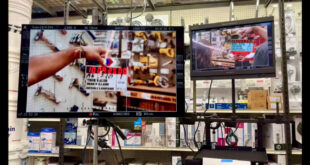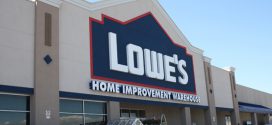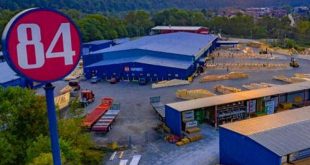The North American Hardware and Paint Association (NHPA) has recognized key home improvement operators for their successes and strategic solutions for 15 years with the Top Guns award. This award highlights retailers who are committed to their communities, their teams and to the independent channel at large.
Mike Brackin, president of HomCo Lumber & Hardware in Flagstaff, Arizona, has been leading his family’s business for nearly 40 years. Read the conversation with Mike below and click here to read a profile about his business and meet the other honorees.
Tell us how you got to where you are today.
Mike Brackin (MB): I’ve had the hardware and lumber in my blood. My great-grandfather founded the company Payless Cashways back in the Great Depression. My grandfather, my grandmother, everyone worked there. My father got his start there as well. After they became a public company, everything changed, and my dad didn’t play politics very well. So, he quit and started his own operating in 1975. At that time, I was 16 years old, and basically I already knew my career path. I’d always wanted to run a lumberyard, so I went to work for my father when I was 16 and I’ve been there ever since.
Our company is in its 46th year, and we’re approaching 50 very quickly. From there, I worked in the lumberyard, did every job possible. Hauling drywall up three flights of stairs in downtown Phoenix. That was my first real experience with, “Do I really want to do something like this?” I graduated college in 1979, and took over the operation in 1986. So that’s my story.
What’s been your hiring strategy recently? What qualities do you look for in a new hire?
MB: Believe it or not right now, we are not having a human resources problem. The reason for that is we’re always looking and we’re always looking to hire good people. As my COO Todd Callan says, “There are no good people out there when you need one.” We’ve taken the philosophy of hosting group interviews once a month, whether we need people or not. We end up hiring one or two, maybe even three people from that group process. Our idea is that we’re going to hire good people, whether we need them or not. By the time they finish their training period, of about 60 days, we usually have a spot for them. As a matter of fact, we always have a spot for them.
I’ll give you an example, two years ago, a young lady applied because her daughter had worked for us. Her daughter was very happy and had told her mom that HomCo was a neat place to work and she was having fun and was learning. Her mother came and went through the interview process. Todd came to me and said, “Hey, we interviewed this woman yesterday who you need to sit down and talk with.” I’m usually not in the interview process generally, but we just knew she could be a manager someday. She came to us with absolutely no experience in the hardware industry. She was the manager of a boat marina. And a year after we hired her, she became our store manager. That’s how a person with no experience in the industry, but she was a people person, she loved our culture, she believed in our culture, she utilized the assets we gave her to take us up a notch. Last year, we had tremendous growth on the retail side of our business, and we would never have been able to handle that with our previous manager because he didn’t use our resources and he wasn’t a leader. She was unbelievable.
We have a lot of our customers apply to work with us who we’ve hired. They enjoy shopping our store, they love our culture, and they want to be a part of our team. It’s been quite remarkable.
Our core values spell out I-IMPACT. Integrity, innovative thinking, maturity and judgement, people-focused, accountability, communication and team leadership. We use our core values to hire, coach, train and if we have to, fire people. Everything’s based on the core values. We’ve been working on that for 18 years. We get a little better every year. I’ve got a hell of an organization of people, and I’ve very blessed and grateful to have them.
What has your product sourcing strategy been over the last 18 months?
MB: If my father knew how much the value of our inventory was right now, he’s turning over in his grave a few times. With the inflation and deflation of lumber. The beauty is we’re all in the same boat. No one has an advantage over others except when it comes to operations.
We’ve got three staff members who are constantly looking for product we’re short of. When it hits the warehouse, they gobble it up, everything. Not just one or two weeks’ supply, but maybe a six month’s supply. Luckily we have the space to handle it.
We’re trying to stay ahead of the curve. We’re able to do more with directs, trying to get product in quicker. My people have done a great job of filling in holes so it looks like we’re complete. We have very few empty pegs, but they’re getting creative with merchandising. Patience is key during these times.
How have you managed customer loyalty?
MB: I think it starts with us with our internal customer service. Treating our employees and vendors with respect. Our vendor customers are fantastic. We’ve developed really great relationships. By delivering on time, complete. Good quality products. We buy a little better lumber when we can get it. We’re solving our customers’ problems, helping them build that house or helping that person fix their faucet. It’s by really concentrating on the shopping experience and exceeding their expectations.
What does the home improvement industry look like in five years? What do independent retailers need to do to compete?
MB: I wish I would have been asked this question five years ago because I would have never guessed it. As far as we’re concerned, we just started in e-commerce, which we feel is going to be an avenue to more commercial business. Brick-and-mortar is still going to be viable along with e-commerce and technology. Consolidation concerns me. But we’ve really got to rely on our relationships with our vendors to keep us viable and to make sure we’re on the same playing field with the boxes and large chains.
But, I think the people who understand culture with that service aspect, I think that’s going to come into play more in the future.
The conversation here is a transcription of the Top Guns panel discussion from the 2021 NHPA All-Industry Conference. It has been edited for clarity and style.
 Hardware Retailing The Industry's Source for Insights and Information
Hardware Retailing The Industry's Source for Insights and Information






